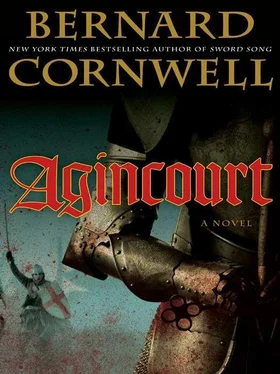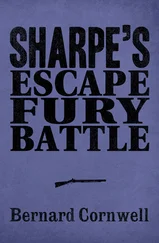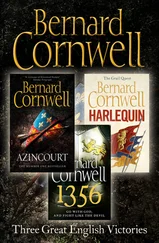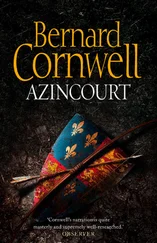“Why are they fighting?” Hook had asked.
“How in God’s name would I know? Or care? What I care about, son, is that the duke’s money comes from the bankers. There.” He had slapped some silver on the tavern table. Earlier that day Hook had gone to the Spital Fields beyond London’s Bishop’s Gate and there he had loosed sixteen arrows at a straw-filled sack hanging from a dead tree a hundred and fifty paces away. He had loosed very fast, scarce time for a man to count to five between each shaft, and twelve of his sixteen arrows had slashed into the sack while the other four had just grazed it. “You’ll do,” Henry of Calais had said grudgingly when he was told of the feat.
The silver went before Hook had left London. He had never been so lonely or so far from his home village and so his coins went on ale, tavern whores, and on a pair of tall boots that fell apart long before he reached Soissons. He had seen the sea for the first time on that journey, and he had scarce believed what he saw, and he still sometimes tried to remember what it looked like. He imagined a lake in his head, only a lake that never ended and was angrier than any water he had ever seen before. He had traveled with twelve other archers and they had been met in Calais by a dozen men-at-arms who wore the livery of Burgundy and Hook remembered thinking they must be English because the yellow lilies on their coats were like those he had seen on the king’s men in London, but these men-at-arms spoke a strange tongue that neither Hook nor his companions understood. After that they had walked all the way to Soissons because there was no money to buy the horses that every archer expected to receive from his lord in England. Two horse-drawn carts had accompanied their march, the carts loaded with spare bowstaves and thick, rattling sheaves of arrows.
They were a strange group of archers. Some were old men, a few limped from ancient wounds, and most were drunkards.
“I scrape the barrel,” Henry of Calais had told Hook before they had left England, “but you look fresh, boy. So what did you do wrong?”
“Wrong?”
“You’re here, aren’t you? Are you outlaw?”
Hook nodded. “I think so.”
“Think so! You either are or you aren’t. So what did you do wrong?”
“I hit a priest.”
“You did?” Henry, a stout man with a bitter, closed face and a bald head, had looked interested for a moment, then shrugged. “You want to be careful about the church these days, boy. The black crows are in a burning mood. So is the king. Tough little bastard, our Henry. Have you ever seen him?”
“Once,” Hook said.
“See that scar on his face? Took an arrow there, smack in the cheek and it didn’t kill him! And ever since he’s been convinced that God is his best friend and now he’s set on burning God’s enemies. Right, tomorrow you’re going to help fetch arrows from the Tower, then you’ll sail to Calais.”
And so Nicholas Hook, outlaw and archer, had traveled to Soissons where he wore the jagged red cross of Burgundy and walked the high city wall. He was part of an English contingent hired by the Duke of Burgundy and commanded by a supercilious man-at-arms named Sir Roger Pallaire. Hook rarely saw Pallaire, taking his orders instead from a centenar named Smithson who spent his time in a tavern called L’Oie , the Goose. “They all hate us,” Smithson had greeted his newest troops, “so don’t walk the city at night on your own. Not unless you want a knife in your back.”
The garrison was Burgundian, but the citizens of Soissons were loyal to their imbecile king, Charles VI of France. Hook, even after three months in the fortress-city, still did not understand why the Burgundians and the French so loathed each other, for they seemed indistinguishable to him. They spoke the same language and, he was told, the Duke of Burgundy was not only the mad king’s cousin, but also father-in-law to the French dauphin. “Family quarrel, lad,” John Wilkinson told him, “worst kind of quarrel there is.”
Wilkinson was an old man, of at least forty years, who served as bowyer, fletcher, and arrow-maker to the English archers hired by the garrison. He lived in a stable at the Goose where his files, saws, drawknives, chisels, and adzes hung neatly on the wall. He had asked Smithson for an assistant and Hook, the youngest newcomer, was chosen. “And at least you’re competent,” Wilkinson offered Hook the grudging compliment, “it’s mostly rubbish that arrives here. Men and weapons, both rubbish. They call themselves archers, but half of them can’t hit a barrel at fifty paces. And as for Sir Roger?” The old man spat. “He’s here for the money. Lost everything at home. I hear he has debts of over five hundred pounds! Five hundred pounds! Can you even imagine that?” Wilkinson picked up an arrow and shook his gray head. “And we have to fight for Sir Richard with this rubbish.”
“The arrows came from the king,” Hook said defensively. He had helped carry the sheaves from the Tower’s undercroft.
Wilkinson grinned. “What the king did, God save his soul, is find some arrows from old King Edward’s reign. I know what I’ll do, he said to himself, I’ll sell these useless arrows to Burgundy!” Wilkinson tossed the arrow to Hook. “Look at that!”
The arrow, made of ash and longer than Hook’s arm, was bent. “Bent,” Hook said.
“Bent as a bishop! Can’t shoot with that! Be shooting around corners!”
It was hot in Wilkinson’s stable. The old man had a fire burning in a round brick oven on top of which a cauldron of water steamed. He took the bent arrow from Hook and laid it with a dozen others across the cauldron’s top, then carefully placed a thick pad of folded cloth over the ash shafts and weighted the cloth’s center with a stone. “I steam them, boy,” Wilkinson explained, “then I weights them, and with any luck I straightens them, and then the fledging falls off because of the steam. Half aren’t fledged anyway!”
A brazier burned beneath a second smaller cauldron that stank of hoof glue. Wilkinson used the glue to replace the goose feathers that fledged the arrows. “And there’s no silk,” he grumbled, “so I’m having to use sinew.” The sinew bound the slit feathers to the arrow’s tail, reinforcing the glue. “But sinew’s no good,” Wilkinson complained, “it dries out, it shrinks and it goes brittle. I’ve told Sir Roger we need silk thread, but he don’t understand. He thinks an arrow is just an arrow, but it isn’t.” He tied a knot in the sinew, then turned the arrow to inspect the nock, which would lie on the string when the arrow was shot. The nock was reinforced by a sliver of horn that prevented the bow’s cord from splitting the ash shaft. The horn resisted Wilkinson’s attempt to dislodge it and he grunted with reluctant satisfaction before taking another arrow from its leather discs. A pair of the stiff discs, which had indented edges, held two dozen arrows apiece, holding them apart so that the fragile goose-feather fledgings would not get crushed while the arrows were transported. “Feathers and horn, ash and silk, steel and varnish,” Wilkinson said softly. “You can have a bow good as you like and an archer to match it, but if you don’t have feathers and ash and horn and silk and steel and varnish you might as well spit at your enemy. Ever killed a man, Hook?”
“Yes.”
Wilkinson heard the belligerent tone and grinned. “Murder? Battle? Have you ever killed a man in battle?”
“No,” Hook confessed.
“Ever killed a man with your bow?”
“One, a poacher.”
“Did he shoot at you?”
“No.”
“Then you’re not an archer, are you? Kill a man in battle, Hook, and you can call yourself an archer. How did you kill your last man?”
Читать дальше












